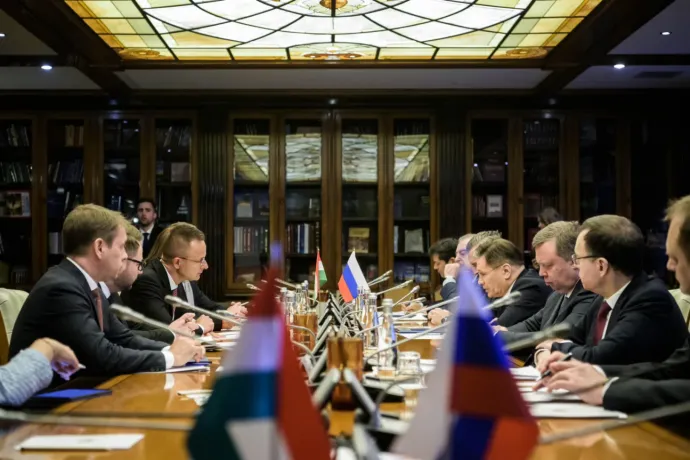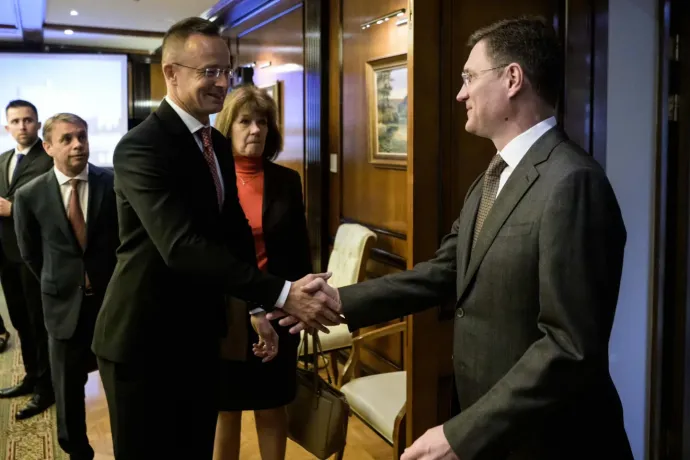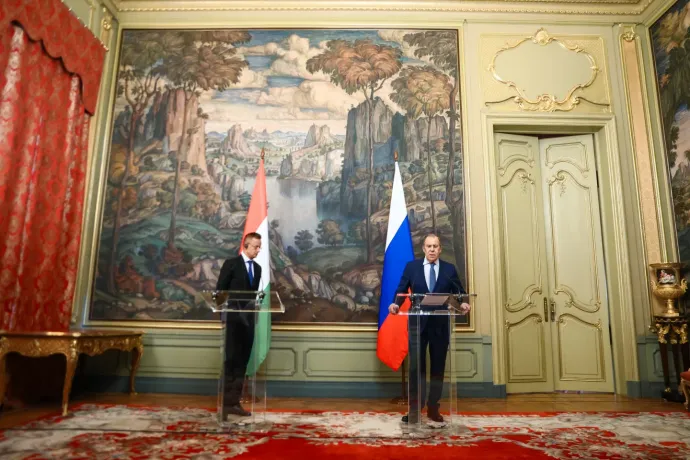Destination: Москва–the Hungarian Foreign Minister visited Russia four times since the outbreak of the war in Ukraine

Hungarian Foreign Minister Péter Szijjártó checked in from Russia on Tuesday for the fourth time since the start of Russia’s aggression on Ukraine. Most Western leaders avoid the warring country altogether, but Szijjártó does not seem to be bothered by this, and in fact seems to avoid even mentioning Russia's responsibility in the war during his visits.
Szijjártó was back in Moscow on Tuesday, where he held talks with the head of Rosatom and Russian Deputy Prime Minister Alexander Novak. The Hungarian Foreign Minister travels a lot, so much so that he made 214 flights in the first 11 months of last year alone. That's a total of about 420,000 kilometres, more than the distance between the Earth and the Moon.
Szijjártó's statements and a seemingly endless series of Facebook photos, make it clear that the Foreign Minister travels, negotiates, shakes hands, discusses, makes agreements and signs contracts in all corners of the world, day in, day out. Yet there is one place which is usually the most interesting to the public: Russia.
Since Russia’s invasion of Ukraine in February last year, the EU and its Western allies have been trying to punish Russia with a series of sanctions. Another means of exerting pressure is diplomatic isolation, part of which includes Western leaders passing the baton to each other in Kyiv and hardly any of them going to Russia.
Not so with Péter Szijjártó, who was decorated with the highest medal a foreigner can receive in Russia (the Friendship Medal) a few months before the war in Ukraine broke out by his Russian counterpart, Sergey Lavrov – and which he has not returned in spite of the war. This week, the leader of Hungarian diplomacy traveled to Russia for the fourth time since Russia’s invasion of Ukraine began, and he continues to strive for a good relationship with the Russians as if nothing had happened in Ukraine at all.
1. The war broke out, let’s go to Moscow!
Szijjártó’s first trip to Moscow following the outbreak of the war took place on 21 July of last year. He discussed natural gas transportation with Russian Foreign Minister Lavrov and Deputy PM Alexander Novak. At the time, gas prices were skyrocketing in Europe, and Szijjártó was likely trying to secure as much gas for as low a price as possible for Hungary. We don’t know what was said exactly, but Hungary has been constantly receiving Russian gas since then – although at the market price, and definitely not below it.
2. Moscow again
The energy crisis was in full swing when Péter Szijjártó checked in from Moscow again on 12 October. He met with Alexei Miller, CEO of Gazprom, but all he said about the meeting was that
“Gazprom has long term plans with Hungary”.
3. A bit of Russian nuclear energy, a bit of Sochi
On 21 November Szijjártó traveled to Sochi for the Atomexpo, where he was one of the speakers at the plenary session. Following last year’s elections in Hungary, Szijjártó took over managing Paks II (the planned construction of Hungary’s second nuclear plant – TN), and following the expo in Sochi, he held meetings with the leaders of Rosatom about the speeding up of the project which started almost ten years ago, and the completion of which is becoming more and more doubtful as the war in Ukraine drags on.
4. It’s spring, let’s go to Moscow again!
On 11 April, Szijjártó visited Moscow again, for the fourth time since the war in Ukraine started. While there, he met with Deputy PM Alexander Novak and Alexey Likhachev, Director General of Rosatom. Once again, the topic of the meeting was natural gas and nuclear energy, and the promise regarding Hungary’s gas supply remained the same. The only substantially new information was the announcement that an agreement has been reached with Russia about the modification of the contract pertaining to the implementation of the expansion of the Paks nuclear plant and the modification of the funding agreement of the same.

+1. Time with friends in New York – but not the Americans
Last September, Szijjártó went to New York for the meeting of the UN General Assembly, where he met up with his old friend, Sergey Lavrov on 23 September. The Hungarian Foreign Minister was actually proud of being the only one from the EU to have had a meeting with the Russian Foreign Minister. The information surfaced a bit later that the EU had specifically requested the Member States not to have bilateral meetings with the Russians. Everyone managed to adhere to this, except for the Hungarians.
+2. Belarus deserves some attention too
In February this year, Szijjártó traveled to the last remaining hardcore dictatorship in Europe and one of Vladimir Putin's last allies, Belarus, to meet Foreign Minister Sergei Aleinik. Naturally, they talked about peace – one of Szijjártó's favorite topics, and then managed to come to an agreement about Hungary giving money for the renovation of the Uspensky Cathedral.
In March, the European Parliament adopted a resolution deploring the fact that Szijjártó had negotiated in Minsk and thus had broken EU unity on Belarus. This does not seem to bother the Hungarian Foreign Minister, as the tour cannot stop: this Tuesday, Belarusian Foreign Minister Sergei Aleinik arrived in Hungary, not only to meet with Minister of Agriculture István Nagy, but also to meet with the Minister of Foreign Affairs who had just returned from Moscow.
Others have a different approach
Apparently, Szijjártó does not agree with the diplomatic isolation of the Russians, as he believes that "it’s necessary to maintain diplomatic relations". By the way, the Western countries still maintain a diplomatic relationship with Russia, but it is worth comparing when their foreign ministers last visited Moscow. The list is far from exhaustive, but it goes something like this:
- Annalena Baerbock (Germany) 18 January 2022;
- Josep Borrell (EU) 6 January 2021;
- Liz Truss and James Cleverly (UK) 10 February 2022;
- Zbigniew Rau (Poland) 15 February 2022;
- José Manuel Albares (Spain) not since 2021;
- Bogdan Aurescu (Romania) not since 2021;
- Jean-Yves Le Drian and Catherine Colonna (France) haven't visited since 2021.
It is striking to see how many visited Moscow in February last year, just before the war: with the German delegation, Viktor Orbán and French President Emmanuel Macron both trying to convince Putin not to launch an attack. The peace mission apparently failed, and since the offensive began, Western politicians in Moscow have been as rare as hen's teeth.
The tone is quite different as well
There are exceptions, of course: a few days after the outbreak of war, for example, then Israeli Prime Minister Naftali Bennett visited Putin in the Kremlin, allegedly to lobby for an immediate ceasefire. A few months later, Austrian Chancellor Karl Nehammer met Putin after witnessing the devastation of the war in Ukraine. Prior to the meeting he said that he would confront Putin with what was happening in Ukraine.

During his four visits since the beginning of the war, Szijjártó has always talked mainly about energy and energy supplies, and has hardly said anything about the war. Of course, the Hungarian government has always condemned the war in statements from home, but this has typically been omitted from Szijjártó's posts from Russia.
The Hungarian Foreign Minister recently explained this to Dutch public television too, saying that we are not strengthening our relationship with Russia, but we are in dialogue with them and are maintaining rational cooperation with them in the field of energy, because without them it would be physically impossible to supply Hungary with the necessary amount of energy sources.
"It may not be very obvious from the United States or the Netherlands, but Russia is part of the reality of Central Europe."
– the Hungarian Foreign Minister said.
We don't know what Szijjártó usually says in face-to-face meetings, but we can deduce something from a recent calculation of ours: we found that since the beginning of his career, there have been four occasions when Szijjártó said he was outraged by something Ukraine had done and there were four instances when he said the same about the United States. Not once was he outraged by something Russia had done.
For more quick, accurate and impartial news from and about Hungary, subscribe to the Telex English newsletter!